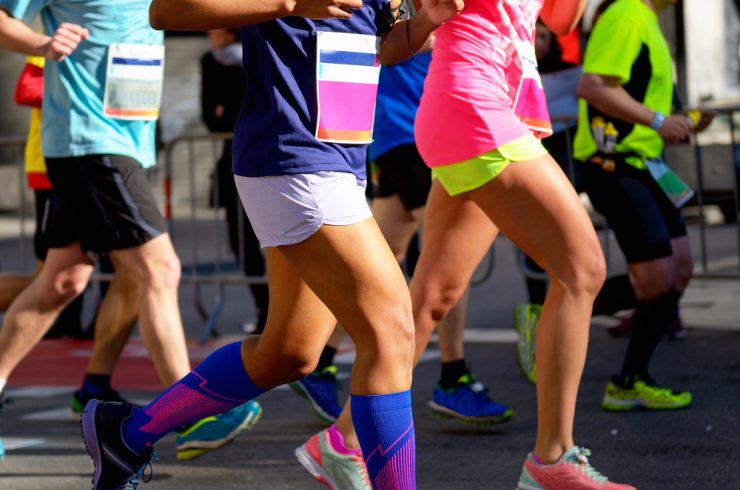Now’s the time to give your joints some special attention to get them ready for the marathon season.
Editor Jane Garton goes in search of the herbs that can help to make them more flexible as well as ease any joint pain.
It’s marathon season again with the London Marathon on April 28th and if you are a runner now’s the time to make sure your muscles and joints are in the very best condition to take you to the finishing line. But what if they are stiff and sore and starting to play you up just as you are about to get super active?
DEVIL’S CLAW
A dose of the herb Devil’s Claw may be just what’s called for to smooth things out as well as reducing any joint pain and discomfort.
When it comes to soothing aching joints Devil’s Claw, long used by Bushmen living in the Kalahari Sands of Namibia, is the herb to try. And now research[i] shows that these Bushmen may indeed have known a thing or two when it comes to reducing joint swelling and pain: Devil’s Claw has been found to contain substances with analgesic and anti-inflammatory properties.
The good news is it has no side effects. The anti-inflammatory action doesn’t block any of the body’s natural processes, as some conventional medications do, so there is no danger of harming the stomach lining, the kidneys, or of causing any circulation or vascular problems.
So how does it work? No one knows for sure but the anti-inflammatory properties of the active compounds, the harpagosides and the plants sterols found in its roots, are thought to be responsible.
GINGER
Much-loved ginger has a warming effect on the body, helping to boost circulation and ease inflamed joints as well as any lingering aches and pains. Include it in your cooking or make yourself a ginger tea. Simply add half a teaspoon of grated ginger root to a cup of very hot water. For extra zing add a pinch of cinnamon or a squeeze of fresh lemon juice.
Alternatively, mix a couple of drops of ginger oil with a tablespoon of almond oil and rub into any areas giving you gyp or have a ginger herbal bath. Just peel and slice a three-inch chunk of fresh ginger root into a pan of water, bring to the boil and simmer until it is a strong dark yellow. Strain, add to the bath and have a good soak
RHODIOLA
Although mostly used to treat anxiety and stress, the Siberian herb rhodiola rosea also has performance-enhancing benefits both mentally and physically. Try taking this wonderful remedy before you run a marathon and during training to maximise your fitness potential.
HOW TO HELP YOURSELF
Keeping on the move is one of the best ways to ease any discomfort and stop joints seizing up. A gentle activity such as swimming which puts no strain on joints is a good option.
Whether you’re reading, working, or watching TV, change positions often. Take regular breaks from your desk or your chair and move around as much as you can.
If you’re overweight losing just 5% of your body weight can help ease joint pain.
Try to stretch daily, but don’t stretch cold muscles. Do a light warm up before stretching to loosen up joints and the ligaments and tendons around them.
Muscles that ache after exercising is normal. But if your pain lasts longer than 48 hours, you may have overstressed your joints. Try not to overdo it when it comes to exercise. Working through the pain may lead to injury or damage.
[i] Chung HJ, Kyung Kim W, Joo Park H, Cho L, Kim MR, Kim MJ, Shin JS, Ho Lee J, Ha IH, Kook Lee S. Anti-osteoporotic activity of harpagide by regulation of bone formation in osteoblast cell culture and ovariectomy-induced bone loss mouse models. J Ethnopharmacol. 2016 Feb 17;179:66-75. doi: 10.1016/j.jep.2015.12.025.
























Add comment